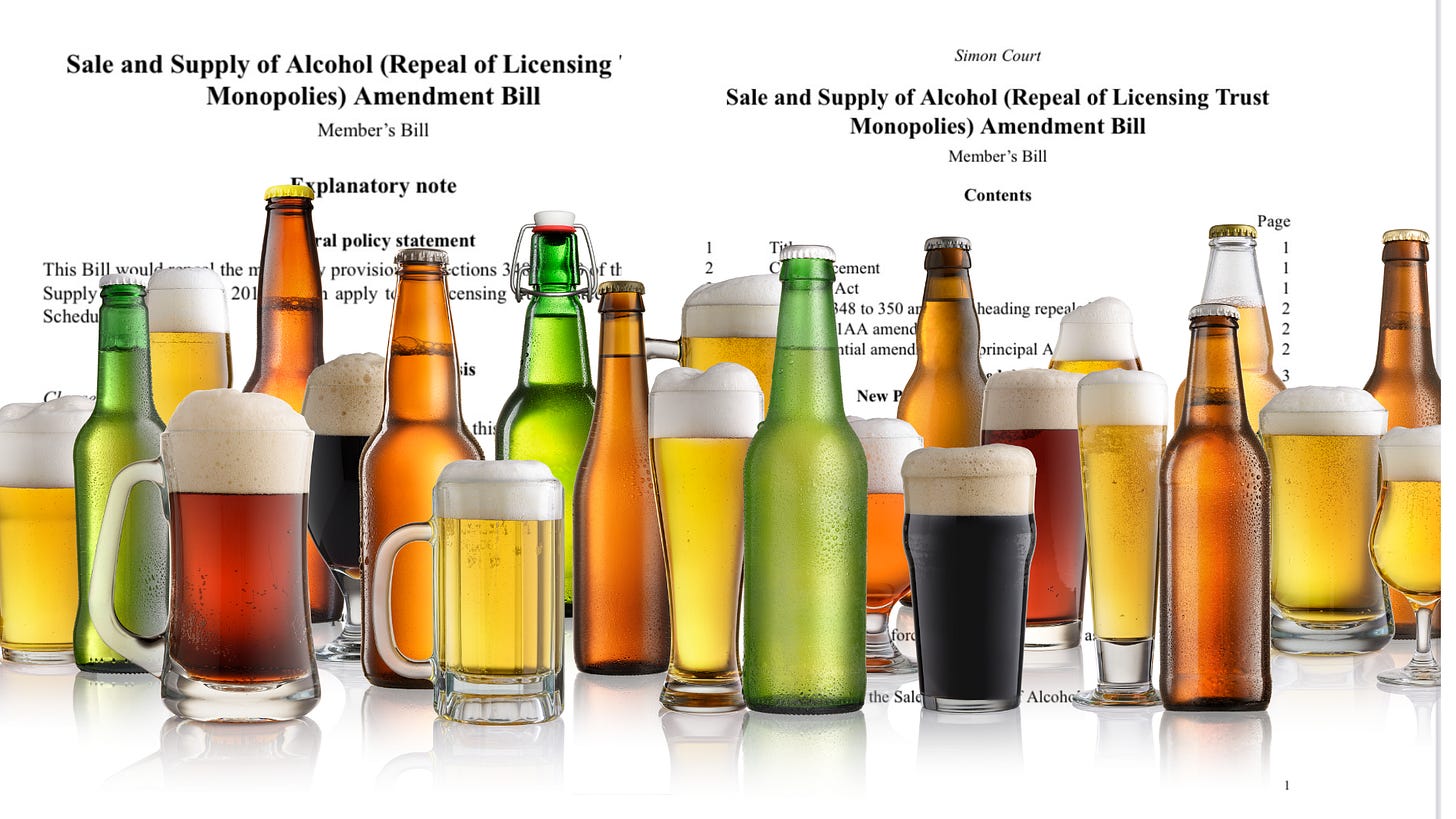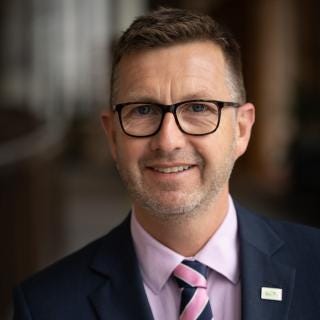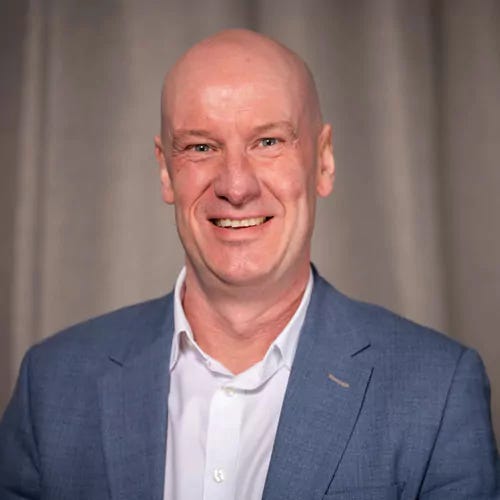MP wants ILT 'monopoly' scrapped; but CEO says he's 'out of touch'
ILT CEO Chris Ramsay said he was “completely blindsided” by Simon Court's member’s bill to scrap licensing trust "monopolies" and confirmed Court had not reached out for information about the ILT.
Help us keep telling Southland stories by becoming a paid subscriber of The Southland Tribune.
ACT MP Simon Court has lodged a new member’s bill to abolish the remaining liquor licensing trusts’ alcohol ‘monopoly’ - including the Invercargill Licensing Trust.
Although ILT CEO Chris Ramsay has pushed back believing Court is “out of touch” and adds there is already a mechanism in place if the public want licensing trust privileges removed.
Court, who is based in West Auckland where the Waitakere Licensing Trust operates, said it was time to treat Westies like adults - and he in turn has lumped Southlanders into the conversation.
“In West Auckland, as well as in Invercargill and Mataura, only licensing trusts can operate liquor stores, taverns, and licensed hotels,” he said, while also describing it as a monopoly and an outdated model.
His bill if successful would repeal the trading privileges held by the Invercargill, Mataura, Portage and Waitakere Licensing Trusts.
“It would break these communities free from silly rules and give entrepreneurial locals the ability to sell alcohol under the same rules that apply nationwide.”
Ramsay said ILT had been “blindsided” by the member’s bill and confirmed Court had not reached out for information about its operation.
“I would have thought there were bigger issues in the national and his local economy to focus on, than him not having the style of bar he wants to drink in,” Ramsay said.
He added Court would be aware that the public already had the opportunity to remove licensing trust trading privileges in their area, if that’s what the majority wanted.
A petition signed by at least 15% of people who live in area can trigger a vote.
In the latest attempt to make that happen in Waitakere in 2022, the group behind the petition failed to get the required numbers.
Ramsay said Court was effectively going against what his constituents had already decided.
“His constituents had the opportunity and assessed it, and it clearly didn’t get the numbers.”
“He’s flying in the face of a majority of people.”
The late Louis Crimp tried to trigger a vote in Invercargill but failed in 2002 and again in 2009 when he did not get enough signatures.
ILT was set up in 1944 and is the largest remaining trust.
Mataura was started in 1955 and the two Auckland-based trusts in the 1970s. At the peak there was close to 30 licensing trusts operating.
Court did not believe the community benefit from “liquor monopolies” was as significant as stated.
He suggested 80 per cent of licensing trust profits were from pokies, not alcohol, and revenue from gaming machines made up most of the funding from the trusts.
Ramsay did not agree with that figure.
In the most recent financial year ILT gave $9.1m back to the community. $5.8m of that came from the ILT Foundation which operates 153 pokie pachines across nine establishments.
That equates to 63% of ILT’s overall funding coming from gaming machines.
“The model operates really well because the gaming machines that are in our venues are 100% Invercargill focused on their returns,” Ramsay said.
“If it wasn’t a licensing trust model then all of a sudden it’s going to a board in Auckland to make decisions on what is best for Invercargill.”
Court believed scrapping licensing trust’s monopoly would also bring back “vibrancy, diversity and colour to local communities” by allowing more bars and eateries to emerge, offering a wider range of choices.
“The benefits will also flow through to other businesses as more people are attracted into the town centre, including those currently venturing into more competition-friendly areas that are not bound by the same antiquated restrictions,” Court said.
Ramsay didn’t think Court was “up to speed” with the situation saying other private operators can, and do, get liquor licenses and operate in Invercargill.
The most notable restriction in place was people being unable to purchase beer and wine from supermarkets - although supermarkets do deliver beer and wine in Invercargill.
“In strict terms, it is not actually a monopoly, but I also don’t want to downplay it. It is a trading privilege,” Ramsay said.
“For that trading privilege, and the slight inconvenience of not being able to get beer and wine supermarkets, last year you got $9m returned to the community.”
Court is not the first ACT MP to voice opposition to licensing trusts.
During a visit to Invercargill in 2017 ACT Party leader told media he was “stunned” by the licensing trust’s “monopoly” in the city.
“You've got a situation where people are compelled to buy their alcohol outside of supermarkets . . . and you've got people spending $40m on a hotel in the middle of Invercargill with their money,” Seymour said at the time.
Whether Court’s bill can gather enough support from fellow MPs will be the big question.
“We are confident we have got the support of our local MPs,” Ramsay said.
“[Invercargill MP Penny Simmonds] was CEO of the SIT when Zero Fees was set up, we gave millions to that. So, we know Penny’s understanding of our model, and appreciation of it, runs as deep as it probably gets,” Ramsay said.
ILT has also been involved in meetings with Prime Minister Chris Luxon and Minister of Hospitality & Tourism Matt Doocey, who Ramsay said have a good base understanding of the licensing trust.
Ramsay did not plan to reach out to Court on the back of his member’s bill.
“Talking to a guy that is a List MP, who clearly doesn’t understand how it works, and I would argue doesn’t listened to his constituents - given they tried a petition and failed - I don’t know what would be achieved by [talking to him] to be honest.”
Court's Sale and Supply of Alcohol (Repeal of Licensing Trust Monopolies) Amendment Bill can be read here.










Absolutely correct Phil T. I also note Mr Court states the population of West Auckland is 300,000 and believes private enterprise would see that there were more bars and eateries in West Auckland if they did away with the Trust scenario. Yes that may be true for his area but when one looks overall at the outlets here in Invercargill operated by the Trust, AND the returns the various charitable, arts and sporting codes receive etc, it is a far cry from what would be returned to the various bodies here in the south IF private enterprise and the likes of the supermarkets were to operate and provide support. AS the DB ad always said......"YEAH RIGHT!" Funds would disappear out of the province so Mr Court you stick to Auckland and let us look after ourselves!!!!
The ACT party is all about ideology rather than reality and serves the interests of a small group of wealthy people who think they should be wealthier. The party founders, Douglas and Preeble did the same selling off all our public owned state assets and every time we pay a power bill we can see how that worked out.
Most the profits our supermarkets make go to Australia so be a long time before we ever see a Countdown Sign taking pride of place and any public venue in the south.
As Mr Ramsay correctly points out we have a process that anyone can follow that gives LOCAL people the ability to ask for the status quo to be reviewed and the decision should always rest in LOCALS hands. Not some puffed up politician from Auckland who has probably never even visited Invercargill